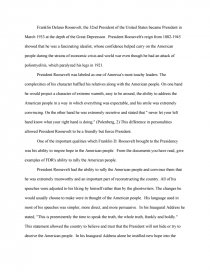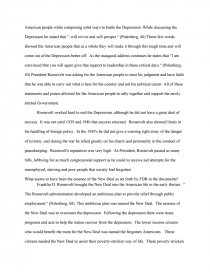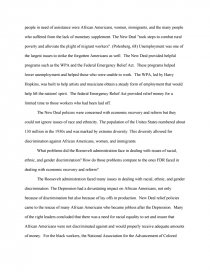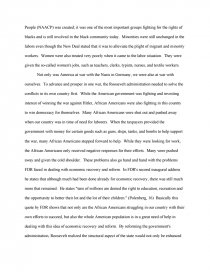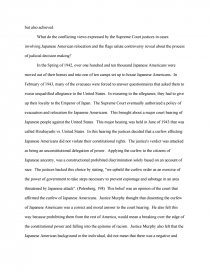Franklin Delano Roosevelt - the 32nd President of the United States
Essay by review • October 7, 2010 • Essay • 1,752 Words (8 Pages) • 2,347 Views
Essay Preview: Franklin Delano Roosevelt - the 32nd President of the United States
Franklin Delano Roosevelt, the 32nd President of the United States became President in March 1933 at the depth of the Great Depression. President Roosevelt's reign from 1882-1945 showed that he was a fascinating idealist, whose confidence helped carry on the American people during the strains of economic crisis and world war even though he had an attack of poliomyelitis, which paralyzed his legs in 1921.
President Roosevelt was labeled as one of America's most touchy leaders. The complexities of his character baffled his relatives along with the American people. On one hand he would project a character of extreme warmth, easy to be around, the ability to address the American people in a way in which everything was expectable, and his smile was extremely convincing. On the other hand he was extremely secretive and stated that " never let your left hand know what your right hand is doing." (Polenberg, 2) This difference in personalities allowed President Roosevelt to be a friendly but fierce President.
One of the important qualities which Franklin D. Roosevelt brought to the Presidency was his ability to inspire hope in the American people. From the documents you have read, give examples of FDR's ability to rally the American people.
President Roosevelt had the ability to rally the American people and convince them that he was extremely trustworthy and an important part of reconstructing the country. All of his speeches were adjusted to his liking by himself rather than by the ghostwriters. The changes he would usually choose to make were in thought of the American people. His language used in most of his speeches was simpler, more direct, and more persuasive. In his Inaugural Address he stated, "This is preeminently the time to speak the truth, the whole truth, frankly and boldly." This statement allowed the country to believe and trust that the President will not hide or try to deceive the American people. In his Inaugural Address alone he instilled new hope into the American people while composing solid ways to battle the Depression. While discussing the Depression he stated that "..will revive and will prosper." (Polenberg, 40) These few words showed the American people that as a whole they will make it through this tough time and will come out of the Depression better off. As the inaugural address continues he states that "I am convinced that you will again give that support to leadership in these critical days." (Polenberg, 40) President Roosevelt was asking for the American people to trust his judgment and have faith that he was able to carry out what is best for the country and not his political career. All of these statements and jesters allowed for the American people to rally together and support the newly elected Government.
Roosevelt worked hard to end the Depression, although he did not have a great deal of success. It was not until 1939 and 1940 that success returned. Roosevelt also showed limits in his handling of foreign policy. In the 1930's he did not give a warning right away of the danger of tyranny, and during the war he relied greatly on his charm and personality in the conduct of peacekeeping. Roosevelt's reputation was very high. As President, Roosevelt passed as many bills, lobbying for as much congressional support as he could to receive aid attempts for the unemployed, starving and poor people that society had forgotten.
What seems to have been the essence of the New Deal as set forth by FDR in the documents?
Franklin D. Roosevelt brought the New Deal into the American life in the early thirties. " The Roosevelt administration developed an ambitious plan to provide relief through public employment." (Polenberg, 68) This ambitious plan was named the New Deal. The essence of the New Deal was to overcome the depression. Following the depression there were many programs and acts to help the nation recover from the depression. The lower income citizens who would benefit the most for the New Deal was named the forgotten Americans. These citizens needed the New Deal to assist their poverty-stricken way of life. These poverty stricken people in need of assistance were African Americans, women, immigrants, and the many people who suffered from the lack of monetary supplement. The New Deal "took steps to combat rural poverty and alleviate the plight of migrant workers". (Polenberg, 68) Unemployment was one of the largest issues to strike the forgotten Americans as well. The New Deal provided helpful programs such as the WPA and the Federal Emergency Relief Act. These programs helped lower unemployment and helped those who were unable to work. The WPA, led by Harry Hopkins, was built to help artists and musicians obtain a steady form of employment that would help lift the nations' spirit. The federal Emergency Relief Act provided relief money for a limited time to those workers who had been laid off.
The New Deal policies were concerned with economic recovery and reform but they could not ignore issues of race and ethnicity. The population of the Unites States numbered about 130 million in the 1930s and was marked by extreme diversity. This diversity allowed for discrimination against African Americans, women, and immigrants.
What problems did the Roosevelt administration face in dealing with issues of racial, ethnic, and gender discrimination? How do those problems compare to the ones FDR faced in dealing with economic recovery and reform?
The Roosevelt administration faced many issues in dealing with racial, ethnic, and gender discrimination. The Depression had a devastating impact on African Americans, not only because of discrimination but also because of lay offs in production. New Deal relief policies came to the rescue of many African Americans who became jobless after the Depression. Many of the right leaders concluded that there was a need for racial equality to set and insure that African Americans were not discriminated against and would properly receive adequate amounts of money. For the black workers, the National Association for the Advancement of Colored People (NAACP) was created; it was one of the most important groups
...
...
